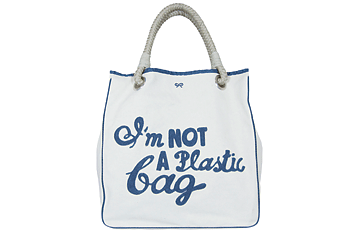Certain consumption choices have become badges of environmental consciousness, often to the exclusion of encouraging people to engage in other, less obvious lifestyle changes like, you know…maybe not buying so much stuff.
This tote bag, designed by a British activist group, came out last summer and became a fashion accessory:
According to this story from Time (which is also where I found the image),
…the bag was first introduced in Great Britain in April —Keira Knightley, Alicia Silverstone and singer Lily Allen were photographed carrying it, fashion magazines jumped on the trend, it was part of the Oscar swag, and before the bags hit the country’s Sainsbury grocery shops, supposed to be its primary retailer, a fanatic fashion following had taken root. The bags sold out immediately, with many turning up on eBay for hundreds of dollars. When 20,000 were released at 450 supermarkets across England, women got in line at 2 a.m. and had snapped up all of them by 9 a.m.
Soon enough, the controversy erupted…The Evening Standard revealed that the so-called green carriers were made in China, using cheap labor, and that the bag was neither organic nor fair trade.
Hindmarch responded that the message of We Are What We Do is that by changing the small things you do in everyday life you can make a large difference. Her company, she said, worked with a reputable supplier in China whose workers are paid double the minimum wage and that complies with Chinese Labor Law. And the bags were shipped by sea, and carbon credits were purchased to offset the environmental impact of production and transport.


Comments 8
Sociological Images » REPLACING ACTIVISM WITH CONSUMPTION — August 4, 2008
[...] « “WELL, AT LEAST HE DRIVES A PRIUS.” [...]
Amusing Toyota Prius ads « ( ) — August 6, 2008
[...] Amusing Toyota Prius ads (Unofficial, not actually used by Toyota. Directed by David Krulik. Found thanks to Sociological Images.) [...]
life is good tote bags — August 7, 2008
[...] project???). All show people engaged in bad behavior (dumping a body, hiring a prostitute,http://thesocietypages.org/socimages/2008/08/04/well-at-least-he-drives-a-prius/Traveling Around Town with my Metro Tote BagIf you are a female executive who travels quite a bit, [...]
fred — August 17, 2008
come to think of it, at slow speed the prius is silent on batteries....
excellent for dumping bodies!
Sociological Images » “I’M SAVING THE PLANET–WHAT ARE YOU DOING?” — August 20, 2008
[...] another example of environmentalism as fashion statement, see this [...]
Sociological Images » BRINGING PEOPLE TOGETHER WITH COKE. NO, NOT THAT KIND. — August 21, 2008
[...] Comments Sociological Images » “I’M SAVING THE PLANET–WHAT ARE YOU DOING?” on “WELL, AT LEAST HE DRIVES A PRIUS.”I didn’t realize this was going to be a [...]
Max Schneider — August 25, 2008
The ad is great. Every time an ad is fresh it is bashed on this blog for not being PC enough.
Gwen Sharp, PhD — August 25, 2008
Max, I was not commenting on whether or not the Prius ads were funny, good, or effective, but rather how they play into a current discourse we have about what being an "environmentalist" is, and how that has to a large degree morphed into a simplistic division: people who drive hybrids and use canvas bags vs. everybody else. The proposed ad is just an exmaple and, yes, funny.